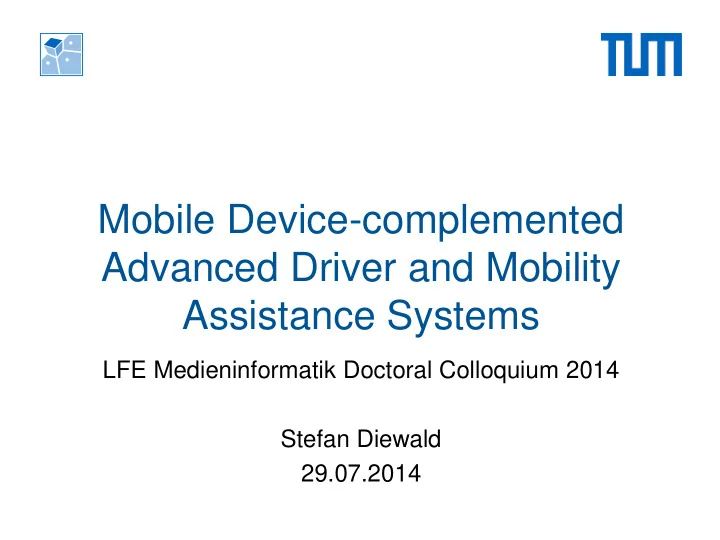

Mobile Device-complemented Advanced Driver and Mobility Assistance Systems LFE Medieninformatik Doctoral Colloquium 2014 Stefan Diewald 29.07.2014
Institute for Media Technology Distributed Multimodal Information Processing Group Technische Universität München http://www.dlr.de/vf/Portaldata/12/Resources/images/projekte/mid/mid2008_c1_l.gif Motivation Mobility is a key factor for self-determined participation in society Mobility constantly changes with advancing technology and people’s needs Examples: Sharing economy Sustainability and comfort Always connected 29.07.2014 Stefan Diewald | Doctoral Colloquium 2
Institute for Media Technology Distributed Multimodal Information Processing Group Technische Universität München Problem Statement http://www.mobiel.de/uploads/pics/Vortrag_pro_Nahverkehr_Wertewandel.jpg Mobility processes have increasing complexity creation of seamless intermodal door-to-door trips control of various different digital services and interfaces Many factors influence mobility processes, for example: User groups Means of mobility Trip purpose and context 29.07.2014 Stefan Diewald | Doctoral Colloquium 3
Institute for Media Technology Distributed Multimodal Information Processing Group Technische Universität München Goal and Approach Context- aware support of users’ mobility processes through personal portable devices Personal portable device (PPD): smartphone, tablet PC, wearables ubiquitous travel companions context information (calendar, social data, location history, …) sensors for gathering further context information users are acquainted to human-machine interfaces high processing power multiple (wireless) communication systems 29.07.2014 Stefan Diewald | Doctoral Colloquium 4
Institute for Media Technology Distributed Multimodal Information Processing Group Technische Universität München Research Questions 1. What are the main mobility requirements of potential users? 2. What are the steps typical intermodal mobility scenarios are composed of? 3. What steps in intermodal mobility scenarios can benefit from digital assistance by users’ PPDs ? 4. What data sources and application programming interfaces (APIs) are necessary for providing mobility-related assistance functions? 5. How can the complexity of operating new mobility services be reduced for the users? 6. How can users be supported in controlling different mobility- related HMIs? 7. What are potential problems and challenges of mobile device- complemented mobility assistance functions? 29.07.2014 Stefan Diewald | Doctoral Colloquium 5
Institute for Media Technology Distributed Multimodal Information Processing Group Technische Universität München Methodology User studies for HMI, Eval- performance measures for uation embedded systems Optimization Concepts, Mock-Ups, Prototypes Selection Research gaps Literature Surveys, Design space for PPD support literature in mobility processes 29.07.2014 Stefan Diewald | Doctoral Colloquium 6
Institute for Media Technology Distributed Multimodal Information Processing Group Technische Universität München Selected Concepts Mobility training □ Physical training with mobility aid □ Automotive user interface training Route planning □ Physical fitness-based route suggestions □ Trust-enhanced route presentation PPD integration in the automotive domain □ Extensible architecture for offloading driver assistance functions in vehicle-to-x communication scenarios □ PPD as HMI for advanced driver assistance system Aspects: Motivation (gamification), engineering, user evaluation 29.07.2014 Stefan Diewald | Doctoral Colloquium 7
Institute for Media Technology Distributed Multimodal Information Processing Group Technische Universität München Example: Mobility Training with PPD Goal: enhance physical mobility and mobility aid handling Ongoing user study: 24 participants (70+ years) Group training vs. printed instructions vs. interactive app 29.07.2014 Stefan Diewald | Doctoral Colloquium 8
Institute for Media Technology Distributed Multimodal Information Processing Group Technische Universität München Example: Automotive User Interface Training on PPDs 30 participants Significant effect only for uncommon functions Ongoing: in-vehicle training 29.07.2014 Stefan Diewald | Doctoral Colloquium 9
Institute for Media Technology Distributed Multimodal Information Processing Group Technische Universität München Example: Route Planning Planned user study: 15 participants (70+ years) Mock-ups for different scenarios o Fitness route based on requirements and preferences (park, culture, shops) o Different approaches for enhancing trustworthiness of route suggestions 29.07.2014 Stefan Diewald | Doctoral Colloquium 10
Institute for Media Technology Distributed Multimodal Information Processing Group Technische Universität München Example: PPD as HMI for Advanced Driver Assistance Systems Addition of route context 29.07.2014 Stefan Diewald | Doctoral Colloquium 11
Institute for Media Technology Distributed Multimodal Information Processing Group Technische Universität München Next Steps http://www.phdcomics.com/comics/archive.php?comicid=1164 Finish user study for “enhanced mobility through physical exercising” Perform user studies for “fitness route”, “in - vehicle UI training” Create a first complete draft of dissertation until July 2015 29.07.2014 Stefan Diewald | Doctoral Colloquium 12
Institute for Media Technology Distributed Multimodal Information Processing Group Technische Universität München Discussion Are the story and the approach comprehensible? What remains open or is missing? How to account for the change of user groups between the conducted user studies? How can the combination of system engineering concepts and human-computer interaction results be sold best? 29.07.2014 Stefan Diewald | Doctoral Colloquium 13
Institute for Media Technology Distributed Multimodal Information Processing Group Technische Universität München References S. Deterding, D. Dixon, R. Khaled und L. Nacke. From Game Design Elements to Gamefulness: Defining “Gamification”. In Proceedings of the 15th International Academic MindTrek Conference: Envisioning Future Media Environments, MindTrek ’11, pages 9 – 15. ACM, 2011. D. Kern und A. Schmidt. Design Space for Driver-based Automotive User Interfaces. In Proceedings of the 1st International Conference on Automotive User Interfaces and Interactive Vehicular Applications, AutomotiveUI ’09 , pages 3 – 10. ACM, 2009. K. Rehrl, S. Bruntsch und H.-J. Mentz. Assisting Multimodal Travelers: Design and Prototypical Implementation of a Personal Travel Companion. IEEE Transactions on Intelligent Transportation Systems, 8(1):31 – 42, Mar. 2007. 29.07.2014 Stefan Diewald | Doctoral Colloquium 14
Recommend
More recommend